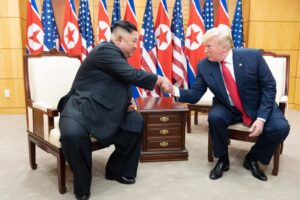The recent Iranian presidential election has once again laid bare the stark reality of the Islamic Republic’s political landscape. The widespread boycott of both the first and second rounds of voting serves as a powerful testament to the Iranian people’s deep-seated desire for the overthrow of the entire regime.
This massive scale of electoral abstention is not just a rejection of the candidates but a wholesale indictment of the system itself. It underscores a growing recognition among Iranians that no substantial change can emerge from within the current political framework, especially under figures like Masoud Pezeshkian, the president-elect who is staunchly aligned with Supreme Leader Ali Khamenei.
The U.S. State Department statement on July 6 unequivocally labeled Iran’s presidential election as “not free or fair.”
“We have no expectation these elections will lead to fundamental change in Iran’s direction or more respect for the human rights of its citizens,” the State Department added. The view echoes the sentiments of many Iranians.
The assertion highlights the broader international understanding of the Iranian regime’s entrenched authoritarianism. However, beyond the international condemnation, it is the internal dynamics and the voices of the Iranian people that speak most loudly.
A collective cry for freedom
The boycott was not a mere act of political apathy but a strategic and vocal denouncement of Tehran’s regime. The overwhelming refusal to participate in a process seen as fundamentally flawed and manipulated sends a clear message — the Iranians do not seek superficial reforms but a complete dismantling of the oppressive structures that have governed their lives for decades.
This boycott is a collective cry for freedom, justice and genuine democratic governance.
Masoud Pezeshkian, despite occasionally labeled as a moderate or reformist, epitomizes the futility of expecting change from within the existing regime. His record, as detailed in various evaluations, shows unwavering loyalty to Khamenei and a consistent alignment with the hardline policies that have characterized the tenure of his predecessor, Ebrahim Raisi, who died in May in a helicopter crash.
From enforcing compulsory hijab laws to supporting s repressive measures of the Islamic Revolutionary Guards Corps, Pezeshkian’s actions speak volumes about his true political stance.
A new president like the old president
Pezeshkian’s alignment with the supreme leader and his adherence to the current governance model make it clear that he is no agent for change. His policies and public statements have consistently mirrored the regime’s oppressive ethos, whether it be on issues of human rights, political freedom or economic justice.
The notion that Pezeshkian could bring about any meaningful transformation is not only misguided but dangerously misleading. It perpetuates the illusion that the Iranian political system is capable of self-reform, thereby undermining the legitimate aspirations of the Iranian people for real change.
The reality is stark. Under Pezeshkian’s leadership, there will be no fundamental shift either domestically or in Iran’s foreign policy. All significant decisions are dictated by Khamenei, ensuring continuity in the regime’s oppressive and authoritarian practices.
This persistent control by Khamenei and his inner circle over all aspects of governance means that regime’s president operates within a tightly constrained framework. The stringent vetting process ensures that only those candidates who pledge unwavering loyalty to the supreme leader can run for office. Thus, the electoral process itself is a mere façade, designed to maintain the veneer of democratic legitimacy while effectively stifling any genuine political pluralism.
The Iranian people are acutely aware of this charade. Their massive boycott of the election is a powerful rebuke to a regime that has consistently failed to address their needs and aspirations. It is a clear rejection of the superficial reforms offered by figures like Pezeshkian and is reflected in the popular slogan of “reformers, hardliners, the game is over.” The international community must recognize and support this legitimate demand for change.
Concrete actions needed from the global community
The global response should go beyond mere condemnation of the flawed electoral process. It should involve concrete actions to support the Iranian people’s struggle for freedom and justice. This includes holding the regime accountable for its human rights abuses, supporting the efforts of the organized opposition like the National Council of Resistance of Iran and applying sustained diplomatic and economic pressure to weaken the regime’s grip on power.
Masoud Pezeshkian, despite any reformist label he might carry, is fundamentally aligned with the supreme leader’s oppressive ideology. The international community must also recognize there is no prospect of a nuclear deal with him as all matters of Tehran’s regime rest with Ali Khamenei. What’s more, the debate over whether the Biden administration should pursue a renewed nuclear deal with Tehran will only serve to reward, embolden and legitimize a repressive regime without addressing its human rights abuses and destabilizing activities in the Middle East.
Khamenei has told “the elected president of Iran to look towards the future and continue the path of Raisi.” It is high time for the international community to stand unequivocally with the Iranian people in their fight for a secular republic.







